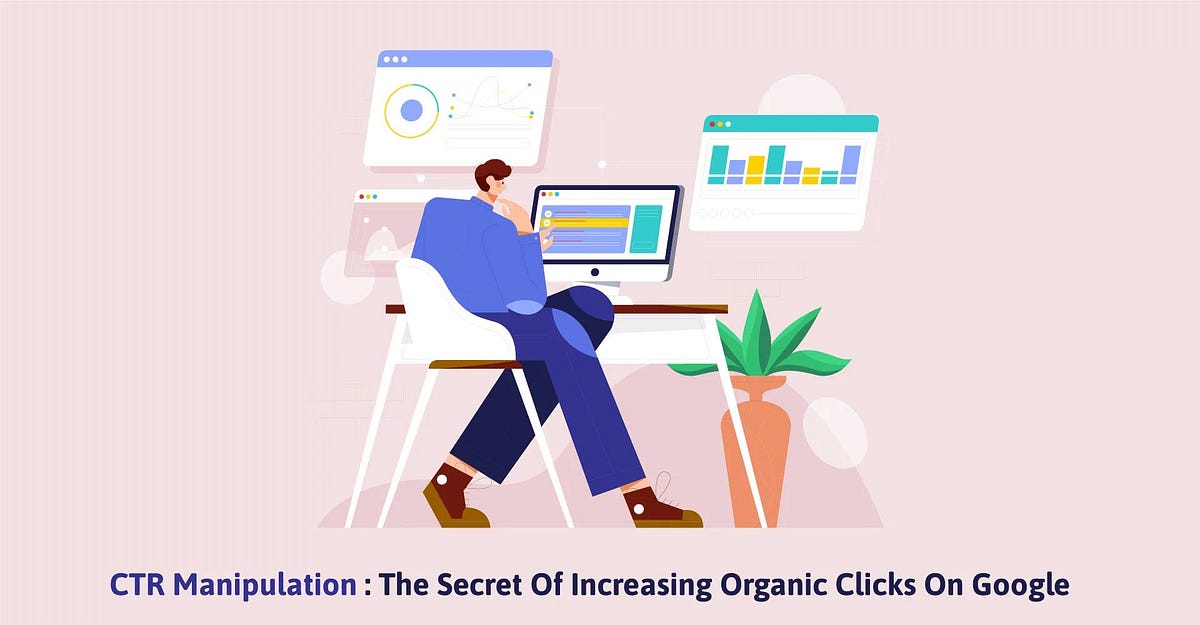CTR Manipulation Approaches: Proven Approaches for Greater Involvement
Wiki Article
Exploring the Relationship In Between CTR Manipulation Services and User Behavior
In the realm of electronic advertising, the impact of click-through rate (CTR) control services on customer habits stays a complicated and intriguing topic. As on the internet platforms increasingly depend on CTR metrics to measure the success of web content, items, and services, comprehending just how these controlled rates influence individual interaction and decision-making procedures is paramount. The interplay in between CTR adjustment and customer actions questions concerning credibility, trustworthiness, and the honest ramifications of such practices. By exploring the intricate connection in between CTR control services and user actions, fascinating insights arise that might reshape our understanding of digital marketing methods and their impacts on customers.Impact of CTR Control on Behavior
Assessing the impact of Click-Through Rate (CTR) manipulation on customer habits reveals essential insights right into the characteristics of online involvement. CTR control entails artificially pumping up the number of click a particular web link or ad to trick customers and search engines. This method can bring about an altered understanding of a web page's appeal or significance, eventually influencing user behavior.
Additionally, CTR control can skew the information made use of by formulas to customize user experiences. This can result in users being served content that does not line up with their choices or rate of interests, eventually leading to a decrease in customer fulfillment and interaction. Understanding the influence of CTR control on customer actions is necessary for maintaining openness and count on online interactions.
User Interaction With Controlled CTR
Individual engagement with adjusted CTR information frequently leads to skewed understandings of on the internet content appeal and significance. When customers connect with material based upon artificially filled with air Click-Through Fees (CTR), they might think that certain details, products, or services are extra preferred or trustworthy than they actually are. This can cause customers choosing based on deceptive information, resulting in potentially undesirable results.Engagement metrics like likes, shares, comments, and time invested in a webpage are frequently affected by CTR manipulation. Individuals might be a lot more inclined to involve with content that shows up to have greater engagement rates, better continuing the cycle of manipulated assumptions. Therefore, material designers and marketers might prioritize creating content that generates high CTR as opposed to concentrating on creating really useful and appropriate product.

Psychological Effects of CTR Control

Furthermore, the psychological effects of CTR manipulation can likewise manifest in modified decision-making processes. Users might be a lot more inclined to click content only based on its perceived Check This Out popularity, rather than its real value or significance to their needs. This behavioral shift can cause a superficial interaction with on the internet content, where individuals might neglect high-quality yet less prominent offerings for those with unnaturally boosted CTRs.
Basically, the psychological ramifications of CTR adjustment highlight the relevance of maintaining transparency and credibility in on-line interactions to foster authentic user interaction and trust.
Moral Considerations in CTR Adjustment
Considering the moral ramifications of manipulating click-through rates (CTR) in online platforms is vital for maintaining integrity and trust within the digital environment. CTR adjustment raises concerns regarding tricking individuals, distorting data analytics, and jeopardizing the reputation of on-line material. One significant honest consideration is the prospective influence on customer freedom and decision-making. By synthetically inflating CTR, customers might be misdirected into clicking web links or advertisements they would not have selected otherwise, leading to a disingenuous online experience. Furthermore, CTR control can skew the performance metrics that find this companies count on to make critical choices, eventually affecting market competition and consumer depend on.An additional moral aspect to consider is the justness of controling CTR to obtain an unfair benefit over competitors. Participating in such practices not just goes against concepts of reasonable play yet additionally weakens the trust fund that customers place in on the internet systems. It is vital for businesses and electronic marketing experts to promote ethical requirements in their techniques to make certain openness, integrity, and lasting sustainability in the online environment.
Ramifications for Digital Advertising And Marketing
With the increasing reliance on digital systems for advertising purposes, the method of adjusting click-through prices (CTR) presents significant effects for the effectiveness and integrity of digital advertising methods. CTR adjustment can lead to skewed data analytics, misleading marketers into believing that their projects are performing much better than they really are. This can lead to misallocation of sources, with business buying underperforming techniques based on falsified CTRs. Moreover, when users understand that CTRs have actually been controlled, it can deteriorate count on the brand name, leading to lasting adverse repercussions for customer loyalty and brand credibility.In addition, using CTR adjustment services can create an unreasonable competitive landscape, where business that involve in such practices obtain a synthetic benefit over those that adhere to ethical advertising and marketing standards. This can stifle development and imagination in electronic marketing, as success becomes even more regarding control strategies than providing authentic worth to consumers. Ultimately, the effects of CTR adjustment for electronic advertising prolong past short-term gains, impacting the total sustainability and reputation of advertising and marketing initiatives in the digital world.
pop over to this site
Conclusion
To conclude, the relationship between CTR control solutions and customer behavior is intricate and complex. The influence of CTR adjustment on behavior, customer involvement with adjusted CTR, psychological results, ethical factors to consider, and effects for digital advertising all play a role fit this connection. Comprehending these characteristics is essential for marketing experts and researchers alike in order to navigate the moral implications and make best use of the performance of their electronic marketing strategies.Report this wiki page